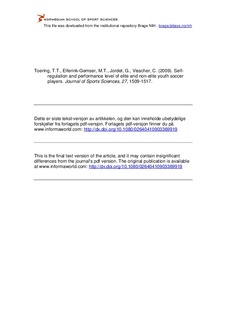| dc.contributor.author | Toering, Tynke T. | |
| dc.contributor.author | Elferink-Gemser, Marije T. | |
| dc.contributor.author | Jordet, Geir | |
| dc.contributor.author | Visscher, Chris | |
| dc.date.accessioned | 2010-12-02T12:54:54Z | |
| dc.date.available | 2010-12-02T12:54:54Z | |
| dc.date.issued | 2009-12 | |
| dc.identifier | Seksjon for coaching og psykologi / Department of Coaching and Psychology | |
| dc.identifier.citation | Journal of Sports Sciences. 2009, 27(14), 1509-1517 | en_US |
| dc.identifier.issn | 0264-0414 | |
| dc.identifier.uri | http://hdl.handle.net/11250/170651 | |
| dc.description | I Brage finner du siste tekst-versjon av artikkelen, og den kan inneholde ubetydelige forskjeller fra forlagets pdf-versjon. Forlagets pdf-versjon finner du på www.informaworld.com: http://dx.doi.org/10.1080/02640410903369919 / In Brage you'll find the final text version of the article, and it may contain insignificant differences from the journal's pdf version. The original publication is available at www.informaworld.com: http://dx.doi.org/10.1080/02640410903369919 | en_US |
| dc.description.abstract | In learning and development, self-regulation can be described as the extent to which individuals are metacognitively, motivationally, and behaviourally proactive participants in their learning process (Zimmerman, 1989, 2006). We examined the relationship between self-regulation and performance level in elite (n = 159) and non-elite (n = 285) youth soccer players aged 11-17 years (mean 14.5 years, s = 1.4). The players completed a questionnaire that assessed planning, self-monitoring, evaluation, reflection, effort, and self-efficacy. A logistic regression analysis was performed (controlling for age) to determine which self-regulatory aspects were associated with players' performance level (elite vs. non-elite). High scores on reflection and effort were associated with a higher level of performance. Findings suggest that elite players may be more aware of their strong and weak points as well as better able to translate this awareness into action. In addition, elite players appear to be more willing to invest effort into practice and competition. It is suggested that these better developed self-regulatory skills may translate into a more effective learning environment and ultimately result in an increased capacity for performance in elite players relative to their non-elite peers. | en_US |
| dc.language.iso | eng | en_US |
| dc.publisher | Taylor & Francis | en_US |
| dc.subject | talent development | en_US |
| dc.subject | metacognition | en_US |
| dc.subject | motivation | en_US |
| dc.subject | learning | en_US |
| dc.subject | sports | en_US |
| dc.title | Self-regulation and performance level of elite and non-elite youth soccer players | en_US |
| dc.type | Journal article | en_US |
| dc.type | Peer reviewed | en_US |
| dc.subject.nsi | VDP::Social science: 200::Social science in sports: 330::Other subjects within physical education: 339 | en_US |
| dc.source.pagenumber | 1509-1517 | en_US |
